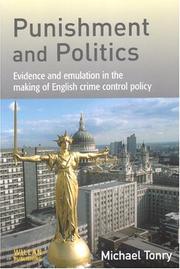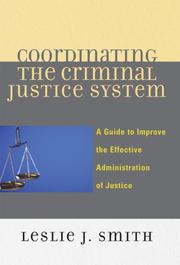| Listing 1 - 10 of 1689 | << page >> |
Sort by
|
Book
ISBN: 1306529255 3486755153 3486794612 3486704885 Year: 2014 Publisher: De Gruyter
Abstract | Keywords | Export | Availability | Bookmark
 Loading...
Loading...Choose an application
- Reference Manager
- EndNote
- RefWorks (Direct export to RefWorks)
Warum werden Menschen kriminell? Welche Ursachen lassen sich für delinquentes Verhalten finden? Solche Fragen beschäftigen Experten genauso wie die breitere Öffentlichkeit - und beide stehen in größerem Ideen-Austausch, als man zunächst meinen könnte. Sabine Freitag nähert sich Orten der Wissensproduktion über die Ursachen von Kriminalität ebenso wie zivilgesellschaftlichen Räumen, in denen die Thesen der Experten diskutiert wurden. Über die gesellschaftliche Annahme oder Ablehnung bestimmter wissenschaftlicher Deutungsangebote entschied nicht zuletzt ihre Kompatibilität mit vorherrschenden Werten, Normen und Selbstbildern. Nur auf dieser Grundlage konnte sich beispielsweise der angestrebte Strafzweck säkularisieren und verwissenschaftlichen: weg von einer moralischen Besserung der sündigen Seele hin zur nüchterneren Absicht, sozialverträgliche, kompetente Bürger herzustellen.
Book
ISBN: 9462744645 9789462744646 9789462366442 9462366446 Year: 2016 Publisher: Hague, Netherlands : Eleven international publishing,
Abstract | Keywords | Export | Availability | Bookmark
 Loading...
Loading...Choose an application
- Reference Manager
- EndNote
- RefWorks (Direct export to RefWorks)

ISBN: 1135998116 1281331872 9786611331870 1843924757 9781135998110 1843920638 9781843920632 184392062X 9781843920625 9781843924753 9781135998189 1135998183 9781135998257 1135998256 9781281331878 6611331875 Year: 2004 Publisher: Cullompton, Devon ; Portland, Ore. : Willan,
Abstract | Keywords | Export | Availability | Bookmark
 Loading...
Loading...Choose an application
- Reference Manager
- EndNote
- RefWorks (Direct export to RefWorks)
Labour has embarked upon a root and branch remaking of the criminal justice system in England and Wales, with a mass of new legislation implemented or planned. It has ensured a continuously high profile for criminal justice issues, and they have been at the centre of wider political discourse. Yet the basis and evidence on which these reforms are being introduced is both uncertain and highly controversial. Despite spending tens of millions of pounds of research into the criminal justice system in the name of evidence-based policy, evidence has counted only in relation to lowlevel technocratic

ISBN: 1461679397 9781461679394 9780761839392 0761839399 Year: 2008 Publisher: Lanham : University Press of America, Inc.,
Abstract | Keywords | Export | Availability | Bookmark
 Loading...
Loading...Choose an application
- Reference Manager
- EndNote
- RefWorks (Direct export to RefWorks)
This guide was developed to assist students, professors, executives of local criminal justice systems, and appointed and elected officials of general government to have a better understanding on how the criminal justice system should function. It may also be of special interest to citizens and public officials who sense that more collaboration and coordination is needed to enhance criminal justice decision making which, in turn, will have a positive impact on local criminal justice systems.Leslie J. Smith advocates that the performance of the criminal justice system should be measured in terms
Book
ISBN: 8892167049 9788892167049 Year: 2017 Publisher: Torino, [Italy] : G. Giappichelli Editore,
Abstract | Keywords | Export | Availability | Bookmark
 Loading...
Loading...Choose an application
- Reference Manager
- EndNote
- RefWorks (Direct export to RefWorks)
Book
ISBN: 1848880294 9004403361 Year: 2010 Publisher: Oxford, United Kingdom : Inter-Disciplinary Press,
Abstract | Keywords | Export | Availability | Bookmark
 Loading...
Loading...Choose an application
- Reference Manager
- EndNote
- RefWorks (Direct export to RefWorks)
Book
ISBN: 1509905162 1509905154 1509905146 9781509905140 9781509905164 9781509905157 9781509905133 1509905138 9781509905157 Year: 2017 Publisher: Oxford ; Portland, Oregon : Hart Publishing, an imprint of Bloomsbury Publishing Plc,
Abstract | Keywords | Export | Availability | Bookmark
 Loading...
Loading...Choose an application
- Reference Manager
- EndNote
- RefWorks (Direct export to RefWorks)
How does the state, as a public authority, relate to those under its jurisdiction through the criminal law? Connecting the ways in which criminal lawyers, legal theorists, public lawyers and criminologists address questions of the criminal law's legitimacy, contributors to this collection explore issues such as criminal law-making and jurisdiction; the political-ethical underpinnings of legitimate criminal law enforcement; the offence of treason; the importance of doctrinal guidance in the application of criminal law; the interface between tort and crime; and the purposes and mechanisms of state punishment. Overall, the collection aims to enhance and deepen our understanding of criminal law by conceiving of the practices of criminal justice as explicitly and distinctly embedded in the project of liberal self-governance
Book
Year: 2010 Publisher: Firenze : Firenze University Press,
Abstract | Keywords | Export | Availability | Bookmark
 Loading...
Loading...Choose an application
- Reference Manager
- EndNote
- RefWorks (Direct export to RefWorks)
This book is centred on the proposal of a new organic criminal discipline for sexual offences in Italy. The Foreword introduces innovative concepts and 'general' breakdowns relating to sexual criminal law. Chapter 1 then addresses a critical analysis of the current discipline, pursuant to articles 609-bis and following of the Criminal Code and the related case law. Chapter 2 tables an in-depth comparative analysis of the legislation governing sexual offences in Germany, Portugal, France and England, which is also extended to legal theory and practice. Chapter 3 then presents, complete with detailed commentary, an organic project of reform for Italian legislation, characterised by a total discontinuity with the current discipline, where the principal incriminations hinge upon the mere 'sexual dissent' of the victim, breaking down different types of sexually relevant behaviour that are at present all lumped in together in the melting-pot of "sexual assault" into three different offences, while also introducing other incisive innovations.
Book
Year: 2012 Publisher: Göttingen : Universitätsverlag Göttingen,
Abstract | Keywords | Export | Availability | Bookmark
 Loading...
Loading...Choose an application
- Reference Manager
- EndNote
- RefWorks (Direct export to RefWorks)
This book contains some of the papers that were presented at the first meeting of the newly formed African Expert Study Group on International Criminal Law/ Groupe des Experts Africaines en Droit Pénal International held in September 2011 in Brussels, Belgium. The group was established under the auspices of the Multinational Development Policy Dialogue (hereinafter 'MDPD') and the Rule of Law programme of the German Konrad-Adenauer-Stiftung ('KAS') in 2010 modeled on the successful sister group in Latin America. This latter group was originally founded as an expert group to monitor the implementation of the Rome Statute of the International Criminal Court ('ICC') in Latin America within the framework of cooperation between KAS' regional Rule of Law Programme and the Department for Foreign and International Law of the Institute for Criminal Law and Criminal Justice of the Georg-August-Universität Göttingen in 2002. The newly formed African group consists of judicial experts with both academic and practical background from various parts of Sub-Saharan Africa. The importance of such a group for the African continent cannot be overestimated. Africa plays a vital role in international criminal law and justice, both as an active player at the ICC and at the regional and national level. As for the group's composition and outreach, the aim is to broaden regional representation and further consolidate membership. In 2012, the group will meet in Nairobi, Kenya to deal with topics surrounding the 'Potential for the domestic prosecution of international crimes in Africa.' Topics for future meetings abound given the multi-faceted African legal and political practice regarding international criminal justice in general and the ICC in particular. The group should in particular monitor the recent international or transnational criminal justice developments at the regional African level as well as relevant national developments. (Excerpt from the introduction by Kai Ambos).
Book
Year: 2017 Publisher: Göttingen : Universitätsverlag Göttingen,
Abstract | Keywords | Export | Availability | Bookmark
 Loading...
Loading...Choose an application
- Reference Manager
- EndNote
- RefWorks (Direct export to RefWorks)
Der vorliegende Band vereinigt die Referate eines am 27. Mai 2016 in Gt̲tingen durchgefپhrten Workshops zur Entwicklung des Jugendfپrsorge- und Jugendstrafrechts in Deutschland. Er beobachtet die Entwicklung dieser Rechtsgebiete in vier politischen Systemen vom Kaiserreich پber die Weimarer Republik und den Nationalsozialismus bis in die Bundesrepublik. Auf der Grundlage von sechs Beitrg̃en werden u.a. das Verhl̃tnis von Strafe und Erziehung, die Radikalisierung des Jugendrechts im Nationalsozialismus sowie die personellen Kontinuitt̃en und die Fortfپhrung einzelner Diskurse und Ideen پber das Jahr 1945 hinaus nh̃er beleuchtet. Mehrere Beitrg̃e beschf̃tigen sich zudem mit dem umstrittenen Gt̲tinger Strafrechtler Friedrich Schaffstein und seinen Konzepten zum Jugendstrafrecht seit der Mitte der 1930er Jahre sowie ihren Einflپssen auf die jugendstrafrechtliche Diskussion in der Bundesrepublik.
| Listing 1 - 10 of 1689 | << page >> |
Sort by
|

 Search
Search Feedback
Feedback About UniCat
About UniCat  Help
Help News
News